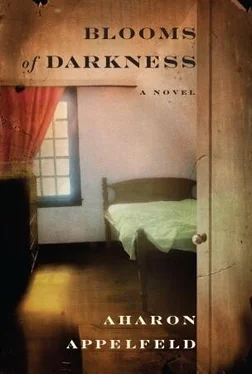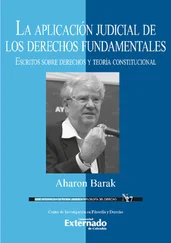Mariana guesses what he is thinking and says, “We’ll always be together.” She hugs him and covers his mouth with hers. He feels her tongue and the taste of brandy.
They could have sat there for a long while, enjoying the landscape and the closeness that warmed them both. But then an unidentifiable noise is heard in the distance — perhaps a tractor or a tank that is stuck and struggling to move. The sudden noise spoils their feeling of closeness.
“We’ve got to move on,” Mariana says, and rises to her feet. “We mustn’t be lazy.”
They advance without speaking. Suddenly Hugo sees the closet before his eyes — the straw mattress, the sheepskins, and the jumble of Mariana’s clothes. That was the home of his imaginings for a year and a half. For hours he would wait painfully for her to come, but when she did appear in the doorway, his despair would vanish like the morning fog.
“Strange.” The word slips out of his mouth.
“What’s strange, dear?”
“The bright light and the sky,” he says.
“It’s a sign that God is watching over us.”
When Mariana drinks from her bottle, she sometimes utters sentences that make no sense, or whose logic is faulty. But they always have a tone of exaltation and wonder. Sometimes she utters an expression or a simile that surprises Hugo with its brilliance. Once, after she had drunk half a bottle and was foggy, she said, “You should know, my dear, that God dwells within you, even in your belly button.”
While they are plodding along, a peasant suddenly appears before them. Mariana is frightened, but she quickly recovers and asks, “Have the Russians come yet?”
“They’re at the outskirts of the city.”
“And when will they get here?”
“Today, apparently,” says the peasant in a subdued tone of voice.
“There isn’t much time,” says Mariana, unwittingly betraying her fear.
The peasant fixes his gaze on her. “Aren’t you Mariana?” he asks.
“You’re mistaken,” she immediately responds.
“I was sure you were Mariana.”
“People sometimes make mistakes.”
“Is this your son?”
“My son? Can’t you see that he’s my son?”
“Mistakes keep happening,” he says, and turns away.
“There are ghosts everywhere,” she mutters as the peasant walks away. Hugo now realizes that the lives of all the women who lived in The Residence — who entertained Germans in their rooms, had sex with them, and partied with them all night — are in danger. In his imagination he nurtured the illusion that Mariana didn’t belong to them. She only pretended she belonged to them. She was secretly always his, and now she really is all his.
They find shelter in a hayloft, abandoned but roofed. Mariana spreads her kerchief on the ground and puts a small bottle of liqueur and some chocolate-covered cookies on it. Hugo tastes the liqueur, and it pleases him.
The sun now stands in the middle of the sky and is reflected on the blanket of snow, which gleams with great intensity. When they traveled to the Carpathians to ski, Hugo’s mother took care to wear sunglasses. He hears the sound of her voice, warning and fearful.
After finishing the strange meal, Mariana lights a cigarette and says, “It’s odd that everyone is glad the war is over, and only I’m afraid.”
“What are you afraid of?”
“Of the Russians. They’re fanatics. They will kill anyone who was in contact with the Germans. How strange — life isn’t so important to me, yet the fear still remains.”
“We’ll slip away from them,” says Hugo, trying to pull her out of her distress.
“I’m not complaining. I feel good now. A night spent sleeping alone or with you is worth everything to me. Since my youth, I’ve been forced to work like a slave, night after night.”
“I’ll watch over you,” says Hugo, looking into her eyes.
“You have to get sturdy and grow. Since you’ve been with me, you’ve grown, but not enough. I’ll make sure you have enough to eat. Spring is around the corner, and when it comes, we can walk along the river, catch fish, and grill them.”
Hugo wants to flatter her, but he can’t find the words, so he says, “Thank you very much.”
Mariana looks at him softly and says, “Friends don’t need to say thank you. Friends help each other. It goes without saying.”
“I was wrong,” Hugo says.
“We have lovely days ahead of us,” Mariana announces, and sips from the bottle.
Later, they keep their distance from the houses on the road. Mariana is in a good mood. She sings and jokes and imitates Madam speaking German. At last she says, “I’m not sorry I left The Residence. In a little while spring will come, the trees will be covered with leaves, and they will be our roof. Mariana loves nature. Nature is good to women. Nature doesn’t threaten, and it isn’t violent. A woman can sit on a riverbank and dip her feet in the water, and if the water is warm, she can swim. Do you agree?”
“Absolutely.”
“You love Mariana, and you make no demands or criticisms of her.”
“You’re beautiful.”
“That’s what Mariana loves to hear. My father, of blessed memory, used to say, ‘Beautiful women are a disaster. All troubles come because of them.’ ” She chuckles with the harsh voice of a crow.
The setting sun stands on the horizon. Frost is blowing in the wind, and Mariana rouses herself from her thoughts and says, “In a little while night will fall, and we have no roof over our heads. We’ve gotten too far from the houses, and now we’ll have to go back to them.” There is no panic in her voice. Hugo has noticed that when the bottle is within reach, her thoughts are clear and without gloomy clouds.
“The horizon is beautiful,” she continues in a nostalgic tone. “When I was a girl, I loved to look at it, but many years have passed. I forgot how beautiful it is. I was sure then that if I walked for an hour or two, I’d get to it. Why are you laughing?”
“I thought the same thing when I was a child.”
“I knew we had something in common,” she says, and they both laugh.
They advance with short steps, and without hurrying. “I would give all the money in the world for a cup of coffee and some cheesecake,” Mariana says. “I’m not hungry, but a cup of coffee and some cheesecake would strengthen the faith within me. What about you, sweetie? You haven’t eaten all day. Mariana is very selfish, and she’s always tied to her own belly button. Sometimes she forgets the people she loves. That’s a flaw in my character. I doubt I can correct a flaw like that. But you forgive me. You always forgive me.”
Meanwhile, night has fallen, and it has gotten colder. Mariana gives Hugo her thick sweater and the kerchief. The coat that he brought with him from home is short on him now, and it won’t button. “Now you’ll be warm,” she says, and is pleased with his new look.
Suddenly, a cabin appears before them, a rather meagerlooking hut with no fence.
“Let’s ask. Maybe they’ll let us spend the night,” she says, and knocks on the door.
An old man opens it, and Mariana quickly tells him that they have fled from the front and are looking for a place to sleep — for payment, of course.
“Who are you?” asks the old man in a sharp voice.
“My name is Maria, and I’m a widow and a mother. This is my son, Janek.”
“What will you pay me with?”
“I’ll give you two packets of German cigarettes.”
“Come in. I was about to go to sleep. A person doesn’t know what the night will bring him.”
“We’re quiet, and we won’t disturb you. In the morning we’ll be on our way.”
“Have the Russians come already?” the old man inquires.
Читать дальше












